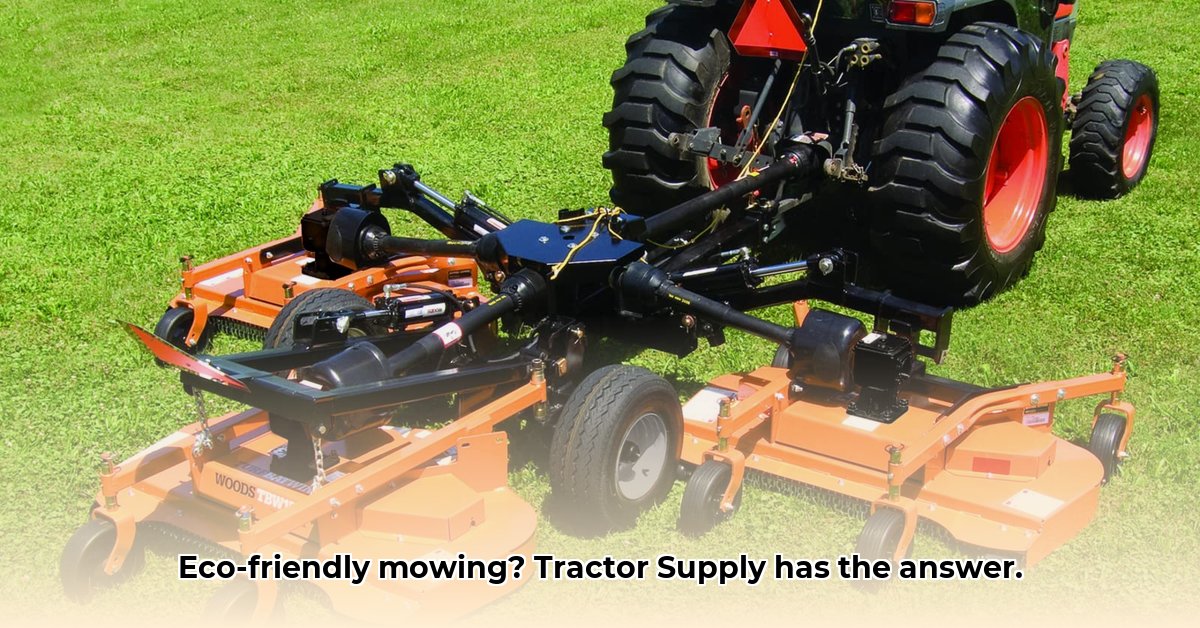
Finish Mowers at Tractor Supply: Your Guide to Eco-Friendly Landscaping
Choosing the right finish mower is crucial for efficient and sustainable land management. This guide helps you navigate Tractor Supply's options, focusing on environmentally friendly choices that meet your budget and needs. For more Tractor Supply mower options, check out their riding mower selection.
Sizing Up Your Needs: Before You Even Start Shopping
Before visiting Tractor Supply, assess your property. What's the acreage? Is the terrain flat or hilly? What's your budget? These questions significantly narrow down your choices. Consider grass type and mowing frequency. A small electric mower suits a residential lawn, while a larger gas-powered model might be necessary for a large farm. Hilly terrain often demands a more powerful machine.
Gas vs. Electric: The Eco-Friendly Debate
Gas-powered finish mowers traditionally offer power for large areas and tough terrain. However, they produce emissions. Electric mowers provide a cleaner, quieter alternative, ideal for noise-sensitive areas. But they typically have shorter run times and require charging. The choice depends on prioritizing environmental friendliness or raw power. Which is more important to your operation?
Feature Focus: What Matters Most?
Regardless of power source, key features include a strong cutting deck for a clean cut, promoting healthy grass growth. Mulching capability is a significant sustainability factor, returning grass clippings to the soil as natural fertilizer, reducing waste and improving soil health. Adjustable cutting height allows customization for various grass types and aesthetics. Consider ease of use and maintenance for optimal efficiency.
Tractor Supply's Finish Mower Lineup: A Closer Look
Tractor Supply offers a wide selection. Always check specifications before purchasing.
| Mower Type | Advantages | Disadvantages | Sustainability Considerations |
|---|---|---|---|
| Gas-Powered Finish Mowers | Powerful, ideal for large areas, widely available. | Higher emissions, louder operation, potentially higher running costs. | Less environmentally friendly; seek CARB-compliant models for reduced emissions. |
| Electric Finish Mowers | Low emissions, quieter operation, potentially lower running costs. | Shorter run time, requires charging, typically less powerful. | More environmentally friendly due to zero direct emissions; consider battery lifespan and charging infrastructure. |
Beyond these categories, consider engine size (horsepower), cutting deck width (affects mowing speed), and self-propulsion (easier maneuvering, especially on slopes).
Keeping Your Mower Happy: Maintenance for Long Life
Regular maintenance is crucial for longevity. Sharp blades ensure clean cuts and prevent grass tearing. Regularly clean the cutting deck to prevent clogging, ensuring efficient operation. For gas mowers, change the oil per the manufacturer's schedule. Proper storage protects it from the elements, extending its lifespan. Effective maintenance saves money and reduces the environmental impact of frequent replacements.
The Future of Sustainable Mowing: What's on the Horizon?
The lawn care industry is evolving. Expect more electric and hybrid models with advancements in battery technology offering longer run times and increased power. Government incentives and growing environmental awareness should further accelerate the shift towards cleaner mowing practices.
"We anticipate a significant increase in the adoption of electric and hybrid mowers over the next five years, driven by both consumer demand and technological advancements." – Dr. Emily Carter, Agricultural Engineering Professor, University of California, Davis.
How to Calculate ROI for Electric Mowers in Sustainable Farming
Choosing the right mower impacts efficiency and farm sustainability. Let's explore factors influencing the long-term financial benefits of electric options.
Matching Mower Size to Tractor Power
Avoid overestimating your tractor's capabilities. A common guideline is 3-4 horsepower (hp) per foot of cutting width for finish mowers (less than the 4-5 hp/ft needed for brush cutters). However, grass height, density, and terrain heavily influence performance. A well-matched mower and tractor ensure smooth, efficient work.
"Underestimating power needs often results in inefficient mowing, leading to increased fuel consumption and wear and tear on the equipment," says John Miller, owner of Miller Farms.
The Impact of Grass Height and Terrain
Tall grass significantly slows down mowing, even with sufficient horsepower. Reduce speed or opt for a smaller cutting width to maintain quality and avoid overworking equipment. Rough terrain presents similar challenges.
Mower Types: A Quick Comparison
Finish mowers provide a neat cut. Rotary cutters tackle tougher brush but demand more horsepower. Flail mowers offer superior safety but may struggle with thick grass or consume more power. Choose based on your farm's specific needs.
Calculating ROI for Electric Mowers
Calculating the ROI for an electric mower involves a cost-benefit analysis over its lifespan.
- Initial Investment: Determine the upfront cost.
- Operational Costs: Compare electricity costs per hour to fuel costs for a gas mower. Quantify avoided pollution.
- Maintenance Costs: Electric mowers generally require less maintenance, leading to cost savings.
- Lifespan: Estimate the operational lifespan of both electric and gas mowers.
- Resale Value: Research typical resale value at the end of their useful lives.
- Productivity: Assess whether the electric mower meets mowing requirements at a comparable or faster rate.
- Environmental Benefits (Quantify): Value reduced greenhouse gas emissions and lower noise pollution.
- ROI Calculation: Use the standard ROI formula (Net Profit / Total Investment) to compare financial returns, including all costs and savings over the mower's lifespan.
Key Takeaways:
- Matching mower size to tractor horsepower is crucial.
- Grass height and terrain affect mower performance.
- Consider different mower types before purchasing.
- Calculating ROI for electric mowers requires a detailed cost-benefit analysis, including environmental factors.